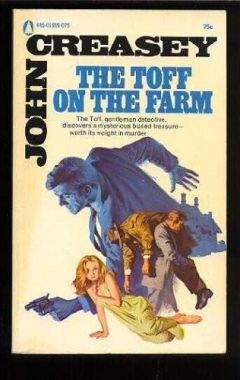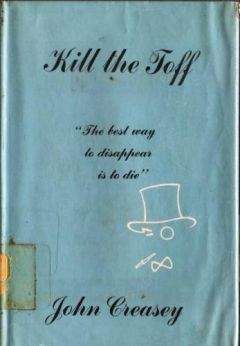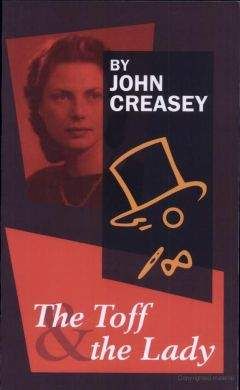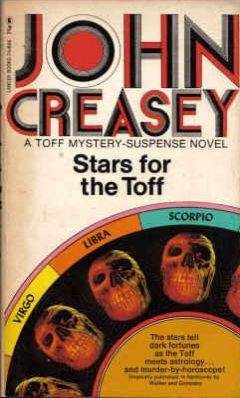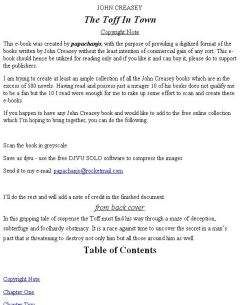John Creasey - The Toff And The Curate
На электронном книжном портале my-library.info можно читать бесплатно книги онлайн без регистрации, в том числе John Creasey - The Toff And The Curate. Жанр: Прочее издательство неизвестно, год 2004. В онлайн доступе вы получите полную версию книги с кратким содержанием для ознакомления, сможете читать аннотацию к книге (предисловие), увидеть рецензии тех, кто произведение уже прочитал и их экспертное мнение о прочитанном.
Кроме того, в библиотеке онлайн my-library.info вы найдете много новинок, которые заслуживают вашего внимания.
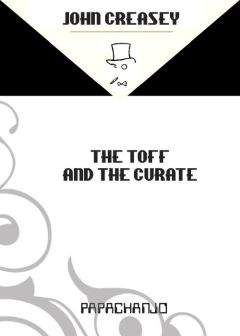
John Creasey - The Toff And The Curate краткое содержание
The Toff And The Curate читать онлайн бесплатно
“But Whitechapel is mine,” protested the Toff. “I was a frequenter of Jupe Street before you knew the difference between Whitechapel and Bethnal Green. What time did Grice say he’d be here, Jolly?”
Jolly answered with hardly a pause, as if he had been expecting the question and Keller stiffened.
“At four o’clock, sir. I think he’s a little late.”
“Grice is on holiday!” Keller growled.
“He was—but he would make any sacrifice in a good cause,” said Rollison, as if gratified. “When I asked him to come back, he promised to start right away. Of course he’ll be alone, so you might prefer to stay. One Superintendent of Scotland Yard won’t make much difference to you. Besides, you are above the police.”
“I know what I’m about,” rasped Keller.
“That’s splendid,” declared Rollison.
“If you don’t—”
“Oh, go away!” snapped Rollison, losing patience. “You and your empty threats—what do you expect to gain? You’ve already lined up half of Whitechapel behind Kemp. Before tonight they hadn’t much time for him, now they’re on his side. Go away and assimilate a little common sense!” He sounded almost pettish as he turned away, passing Jolly and the second man and, pushing the latter roughly to one side, he strode into the drawing-room and picked up the telephone.
The success of the trick he had planned depended upon Jolly—who dodged back into the drawing-room and slammed the door. Rollison dropped the telephone and jumped to the door, putting his full weight against it as Jolly turned the key. Three heavy thuds shook it; then the men outside ceased trying to break it down.
Rollison and Jolly stood either side of the door so that, if Keller or his man fired into it, they would be out of harm’s way.
Rollison spoke in a loud voice.
“Nicely done, Jolly!”
“Thank you, sir,” said Jolly, soberly.
“I hope Grice doesn’t run into them,” Rollison went on, sounding anxious. “He’s an impetuous beggar and might start a riot. I’d better ring for someone else from the Yard,” he added. He walked heavily round the room then lifted the telephone and banged the receiver up and down several times.
The hall door slammed.
Rollison grinned. “That might be a pretty trick to make us show ourselves again, we’ll stay where we are . . . Hallo, is that Scotland Yard? . . . Rollison speaking, give me Inspector Mason, please.” After a pause, he went on: “Yes, Sergeant Hamilton will do . . . hallo, Hamilton? Send a couple of your liveliest men round to the flat, will you? I’m locked in my own drawing-room with two homicidal maniacs in the hall, threatening to . . . yes, of course I’m serious!”
The startled sergeant promised that he would send men immediately and Rollison replaced the receiver.
The flat was on the first floor and it would be possible to climb out of the window and surprise Keller from the rear. But he had no weapon and had a healthy respect for the other’s gun. Even if he only tried to follow them, it was so dark that they would probably shake him off. It would be best to stay where he was, confident that the flat would be clear of the intruders by the time the police arrived.
He and Jolly conversed in whispers but that soon palled. They heard nothing for five minutes, then a car drew up outside and heavy footsteps came thumping on the stairs. Not until the police were outside the flat did Rollison unlock the drawing-room door and let them in.
Sergeant Hamilton, tall, fair and brisk, hoped Rollison had not been pulling his leg.
“I have not!” Rollison assured him, fervently, “I expected the men to try to break the door down but they heard me telephoning you and decided not to wait.”
“Who were they?” demanded Hamilton.
“I haven’t the faintest idea,” said Rollison.
Afterwards, when the police had gone and as dawn was breaking, he told Jolly that he did not propose to mention Keller’s name to the police until he knew more about the man. For one thing, Keller’s certainty that he was in no danger from the police was a remarkable thing. For another, he wanted to feel the pulse of the East End before he stirred up police action. He had been perfectly serious when he had told Kemp that it would be better to fight on his own for the time being—the masses of the district would rally round him when it was seen that he was trying to fight single-handed—or even with help from the Toff.
At a quarter-past five, Rollison went to bed.
At a quarter-to eight, Jolly called him for Rollison, an acting Colonel, was due at his office in Whitehall by nine thirty. He had the week before him, for it was only Tuesday, and there was little chance of getting leave; the only way of doing that, he complained to Jolly, was to go sick.
“Won’t you await events before taking that step?” asked Jolly.
“You mean won’t I give you a free hand?” said Rollison, smiling unamusedly. “I suppose I’ll have to. See Kemp and the Whitings and keep me in touch with what happens. I’ll lunch at the club, fco ring me there.”
“Very good, sir,” said Jolly.
And the Toff, sadly, set out for Whitehall.
Twice, in the course of the morning, a colleague said with some exasperation that he was not giving his mind to the subject under discussion and twice he apologised and tried to pull himself together. In truth, he was apprehensive lest the Whitings had been made to suffer for their boldness. The one reassuring factor was that Bill Ebbutt had sounded as if he knew what kind of proposition he was up against with Keller and would take elaborate precautions. It was absurd that Keller should be able to inspire such apprehension and equally absurd that he should be so self-assured.
“But he isn’t!” exclaimed Rollison, aloud.
“Now look here, Rolly,” said plump, bespectacled Colonel Bimbleton, “you know perfectly well that he was.”
“Eh?” asked Rollison.
“Oh, you’re impossible!” declared Bimbleton, then peered at him with sudden interest. “I say, Rolly, is something up?”
“Up is the word,” said Rollison. “I’m sorry, Bimble, but I can’t concentrate on this report. Would you care to have a shot at it yourself?”
Bimbleton regarded him curiously.
“Well, I don’t mind trying,” he conceded, “provided you’ll look through it afterwards and make sure I haven’t pulled a boner.”
Rollison promised this and Bimbleton went off to wrestle with a report on pilfering from army stores depots, a task which Whitehall, in all its wisdom, had ordained to be eminently suitable for a man known to associate with the police.
Jolly did not telephone the office or the club.
After lunch, Rollison hurried back to the office but his clerk, a plump ATS sergeant, had no message for him.
In his cogitations, Rollison had got no further than that Keller was afraid of the police taking action against him but had reason to think that a lot of prodding would be needed to make them. Keller had been at great pains to try to make sure that Whiting said nothing about the episode of the stolen knife, although there was nothing original in his methods. There were occasional outbursts of intimidation in the East End and, sometimes, a terror-wave which rarely lasted long once it was discovered by the authorities but which might have gained a powerful hold before the police learned of it. Many a man had been frightened into refusing to give evidence, even to committing perjury, by threats such as Keller had made to Whiting.
Two inescapable facts troubled Rollison most.
One was that a man whose name he did not yet know had been murdered and—judging from the evidence so far available—one Joe Craik had been framed for the murder. The sccond was that Keller had a very powerful reason for wanting to drum the curate out of the St Guy’s district.
He dictated letters and signed them, made a brief report on a matter he had been handling by himself, went over Bimbleton’s prosy report with its author and made a few comments and left for Gresham Terrace.
Jolly was not at the flat.
Rollison began to feel worried about his man; even if there was nothing to report, Jolly should have telephoned by now. When at last the telephone rang he hurried to it, hoping to hear Jolly’s voice. Instead, he heard Kemp’s— and Kemp sounded excited.
CHAPTER SIX
More News From Kemp
“Great Scott, Rollison, I’ve been trying to get you all the afternoon!” exclaimed Kemp. “Where the dickens have you been?”
“I should have given you my office number,” said Rollison. “You’d better take a note of it.”
“Never mind that! Can you come here at once?”
“What’s the trouble?”
“I’ve had a visit from a most astonishing fellow,” said Kemp, amazement making his voice shrill. “I don’t know his name but you should have heard the way he talked! He told me that if you didn’t stop interfering, he would mighty soon make you!”
“Did he have brown eyes and a gruff voice?”
“Yes, he did. How did you know?”
“He calls himself Keller,” said Rollison. “Don’t worry about his threats—did he do anything?”
He heard Kemp’s sharp intake of breath.
“He didn’t actually do anything,” said the curate. “But—he made the most astonishing offer. He offered to replace all the damaged goods at the hall and give five hundred pounds to St Guy’s Relief Fund, if—” Kemp grew almost incoherent.
“If you resigned?” asked Rollison.
“Yes!”
“What did you tell him?”
“I told him,” said Kemp, in a deep voice, “exactly where to get off!”
“That’s the spirit!” acclaimed Rollison, feeling considerably relieved, “I was afraid you might have fallen for it.”
“I might have done yesterday,” said Kemp, “but not now—I’ve heard a lot about you today. Last night, I only had your name and the little I’d heard about you from the Whitings but today—”
“Spare my blushes,” said Rollison. “How did you part with our brown-eyed briber?”
“Well, as “a matter of fact,” said Kemp, less boisterously, “I felt a bit uneasy. He’s a funny customer, isn’t he? He went out breathing threats and said he would give me forty-eight hours to change my mind. He also said you would have forty-eight but I’m not particularly worried about you.”
“So he’s given a time limit, has he?” asked Kollison. “Don’t let yourself be caught napping any time during the next forty-eight hours. Did he have anything else to say?”
“No.”
“Have you thought of anything that might be the cause of the trouble?”
“I’ve racked my brains but I can’t think of anything,” declared Kemp. “In fact, I don’t think there can be—”
“Of course there is,” interrupted Rollison. “How are the Whitings?”
“They’re all right. Those friends of yours have been to and from school with two of the youngsters. It was really funny this afternoon, one of the children is only eighteen months old and Mrs Whiting and the grandmother pushed him out to the shops with two hefties walking behind them. It caused quite a sensation.”
“Good!” said Rollison. “Publicity is always useful.”
He omitted to say that Kemp’s spirits seemed to be much brighter and asked:
“Have you seen my man?”
“That glum looking fellow, what’s his name?”
“Jolly.”
“What?” asked Kemp, incredulously, and then added hastily: “No, 1 haven’t seen him. Should he have come here?”
“No, it’s all right,” said Rollison.
He rang down, after promising to see Kemp later. He was worried but smiled from time to time when he thought of Keller’s offer. After setting his rough-necks on Kemp, attempted bribery was a climb-down—but it told him how seriously Keller intended to get rid of the curate.
Ten minutes later, the telephone rang again. This time, Rollison heard his man’s prim voice.
“Good evening, sir.”
“Well, well!” said Rollison and added sarcastically: “It’s nice of you to ring me.”
“I’m sorry that I had no opportunity of telephoning earlier,” said Jolly, stolidly, “but my inquiries took me out of London and I had to choose between continuing with them and advising you that I could not do so. I came to the conclusion—”
“Yes, you were right,” said Rollison, hastily. “Where are you now?”
“In Loughton, sir, near Epping Forest. I—” there was a short pause before Jolly went on in a sharper voice: “I am quite all right but I must go now. I will telephone again at the earliest opportunity. Goodbye, sir!”
Rollison heard the receiver bang down.
He sat contemplating the telephone for some lime. It was rare that Jolly allowed himself lo he hurried and he had taken his time at the beginning of the conversation. Only one likely explanation presented itself—that Jolly was keeping watch on someone who had reappeared sooner than he had expected. Reassured, Rollison did not waste time in more than passing speculation on what had taken Jolly to Loughton.
He looked through the evening papers for an account of the murder of the previous night. It was tucked away on an inside page and contained the statement that the murdered man’s name was O’Hara. Joseph Craik, of la, Jupe Street, had been charged with the murder and been remanded for eight days. Det Sergeant Bray, of Scotland Yard, had made the arrest. Inspector Chumley, of the AZ Division, was not so much as mentioned.
“I suppose I shall have to find out what they’re doing sooner or later,” Rollison mused.
Yet the more he pondered, the more determined he became to let the police make the first move. Craik would come to no harm while under remand—he might even be safer in Brixton than in his shop. Had Superintendent Grice been at the Yard, Rollison would have taken a different course; he could talk to Grice off the record and be sure that confidences would be respected, provided the law was not too openly flouted.
A ring at the front door interrupted him.
He opened it, warily, to see a vision in a flowered frock and a wide-brimmed hat with a radiant smile and a beauty spoiled only by a nose which some called retrousse. There were few callers he would have welcomed at that juncture, unless they were concerned in the affair of the harassed curate, but he felt a genuine pleasure at the sight of Isobel Crayne.
“Rolly!” she cried.
“Hallo!” He took her hand and kissed her on the cheek which she presented laughingly. Then he held her at arm’s length and eyed her with his head on one side and a gay smile in his eyes.
“Yes,” he said at last “An improvement, even in you! Isobel, it’s good to see you!”
“What an ass you are!” said Isobel, allowing herself to be drawn through the hall into the drawing-room. She took off her hat and dropped it into an easy chair, looking at him all the time. “How are you, Rolly?”
“I was jaded,” declared Rollison. “In fact I was wondering how I could cheer myself up and lo! I open the door and a vision enters.”
Похожие книги на "The Toff And The Curate", John Creasey
John Creasey читать все книги автора по порядку
John Creasey - все книги автора в одном месте читать по порядку полные версии на сайте онлайн библиотеки My-Library.Info.
